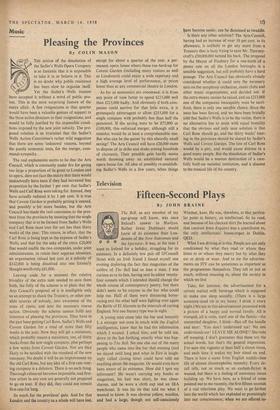Pleasing the Provinces
By COLIN MASON
THE notion of the dissolution of the Sadler's Wells Opera Company is so fantastic that it is impossible to take it in or believe in it. This is no doubt why public resistance has been slow to organise itself. Yet the Sadler's Wells trustees have accepted it without a word of public pro- test. This is the most surprising feature of the entire affair. A few resignations in that quarter would have been a valuable gesture of support to the three active directors in their resignations, and would be fully justified by the impossible condi- tions imposed by the new joint subsidy. The pro- posed solution is so irrational that the Sadler's Wells Action Committee's rather wild suggestion that there are some 'unknown' reasons, beyond the purely economic ones, for the merger, com- mands sympathy.
The real explanation seems to be that the Arts Council, which is constantly under fire for giving too large a proportion of its grant to London and to opera, dare not face the outcry that there would undoubtedly have been if they had increased that proportion by the further 1 per cent. that Sadler's Wells and Carl Rosa were asking for. Instead, they have actually reduced it by 1 per cent. It is true that Covent Garden is probably getting it instead, and possibly a–bit more besides, but the Arts Council has made the real concession to the pres- sure from the provinces by insisting that the single company that is to be formed from Sadler's Wells and Carl Rosa must tour for not less than thirty weeks of the year. This means, in effect, that the Carl Rosa is being kept at the expense of Sadler's Wells, and that for the sake of the extra £20,000 that would enable the two companies, under joint administration, to retain their separate identities, an organisation valued last year at a subsidy of £142,000 is being dissolved into one formerly thought worth only £61,000.
Leaving aside for a moment the relative triviality of the extra sum needed to save them both, the folly of the scheme is so plain that the Arts Council's proposal of it is intelligible only as an attempt to shock the Treasury, or other pos- sible sources of subsidy, into awareness of the costs of opera, and into the necessary rescue action. Obviously the scheme cannot fulfil any intention of pleasing the provinces. They have in the past been getting Carl Rosa, Sadler's Wells and Covent Garden for a total of more than fifty weeks in the year. Now they will get a minimum, which probably means a maximum, too, of thirty weeks from the new single company, plus perhaps a few weeks from Covent Garden. Nor are they likely to be satisfied with the standard of the new company. No doubt it will be an improvement on the old Carl Rosa, but any idea of a first-rate tour- ing company is a delusion. There is no such thing. Thorough rehearsal becom,!s impossible, and first- rate artists in any case are generally not prepared to go on tour. If they did, they could not remain first-rate for long.
So much for the provinces' gain. And for that London and the country as a whole will have lost, except for about a quarter of the year, a per- manent opera house where those too hard-up for Covent Garden (including many visitors as well as Londoners) could enjoy a wide repertory and a high average level of performance, at 'prices lower than at any commercial theatre in London.
As far as economics are concerned, it is from any point of view better to spend £235,000 well than £215,000 badly. And obviously if both com- panies could survive for that little extra, it is grotesquely extravagant to allow £215,000 for a single company with probably less than half the personnel. If the saving were to be £75,000 or £100,000, this • enforced merger, although still a mistake, would be at least a comprehensible one. But who can be the gainer by this absurdly small saving? The Arts Council will have £20,000 more to dispose of in dribs and drabs among hundreds of claimants. Their possible. gain hardly seems worth throwing away an established national opera house for. All idea of possibly re-establish- ing Sadler's Wells in a few years, when things have become easier, can be dismissed as twaddle.
Is there any other solution? The Arts. Council, having had an increase of over 10 per cent, in its allowance, is unlikely to get any more from a Treasury that is busy trying to save Mr. Thorney- croft's £50,000,000 behind his back. The proposal by the Mayor of Finsbury for a one-tenth of a penny rate on all the London boroughs is a sensible suggestion, but will probably have a hard passage. The Arts Council has obviously already considered whether it could save the necessary sum on the symphony orchestras, music clubs and other music organisations, and decided not. If the extra money cannot be raised, and on £215,000 one of the companies inescapably must be sacri- ficed, there is only one sensible choice. Since the issue has been forced, and, we have been brutally told that Sadler's Wells is to be the victim, there is no alternative but to insist with equal brutality that the obvious and only sane solution is that Carl Rosa should go, and the thirty weeks' tour- ing in the provinces should be shared by Sadler's Wells and Covent Garden. The loss of Carl Rosa would be a pity, and would cause distress to a good many people. But the• dissolution of Sadler's Wells would be a wanton destruction of a care- fully built-up national institution, and a disaster to the musical life of the country.


































 Previous page
Previous page